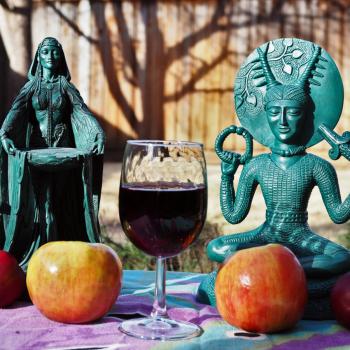Editors' Note: This article is part of the Patheos Public Square on Faith and the Election. Read other perspectives here.
A few months ago, a host on a BBC Radio Sunday morning faith and values show asked me to explain the popularity of Donald Trump among American Christians to his baffled audience, and I took a deep breath.
"I can't explain it," I said. "I can't account for the fact that although his life and past actions stand in sharp contradiction to their beliefs, many American Christians support him in the current election."
"It seems clear to me," I concluded that Sunday morning, "that somehow we are able to divorce our deeply-held religious beliefs from our political beliefs. Sometimes we make political decisions from our worst selves instead of our best selves."
American Christians know that Jesus taught forgiveness, inclusion, care for the poor, peace, and mercy. So, echoing the radio host, how do we account for the fact that Donald J. Trump will be the Republican nominee and many American Christians will support him in the general election? How do we account for the fact that many of his primary opponents called themselves Christian, yet felt the need to follow his example, choosing attack, exclusion, bigotry, and fear-mongering as campaign strategies? How do we account for the fact that voters of all faiths and none seem less interested in the art of governing, and more in what conservative columnist David Brooks calls "political narcissism, in which [voters] don't accept the legitimacy of other interests and opinions. They don't recognize restraints. They want total victories for themselves and their doctrine"?
Where does faith fit into all of this?
In 2012, I wrote a book for Patheos that took as its premise that American Christians often practice politics not out of their faith, but out of secular concerns. That seems truer now than it was when I wrote it. In this election, Christians who support political demagogues may not be voting from their belief in biblical principles or church teachings, but instead, out of secular fear and anger, and out of the dark side of their faith, a willingness to exclude, demonize, and attack.
Given this, it seems that the Gospel according to Donald Trump has less to do with Christianity's good news than it does with a deeply secularized, yet deeply powerful narrative of individualism, prosperity, and patriotism that checks many of our American boxes but engages few of our Christian beliefs. Perhaps, as commentators have noted, some American Christians are supporting Trump because they want to win no matter what, because as Ross Douthat put it, they think "Christians need to make sure the meanest, toughest heathen on the block is on their side. So it makes sense to join an alliance of convenience with a strongman, placing themselves under his benevolent protection, because their own leaders have delivered them only to defeat."
Pursuing the win at all costs is a doubly sensitive topic for me at this moment, since my beloved Baylor University has pursued a strategy of winning — more money, more athletic success, more fame and exposure — at the expense of its Christian values, and it has cost us dearly. As you doubtless have read or heard, this pursuit of the win took us light years away from our professed Christian calls to compassion, justice, and humility, and it has cost us not only the president and football coach who delivered wins and dollars to the university, but, much more importantly, caused untold suffering to young women — our own students — who were set aside as inconvenient when they were victimized by football players. Our pursuit of the win above all else has exposed us as frauds and hypocrites for saying we loved Jesus when what we really loved was something else, and it will take years to rebuild trust and regain any kind of moral authority.
What we have discovered in the midst of this horror is that we are not a Christian institution if we govern ourselves only by what the world finds important — that, in fact, to do so is a betrayal of what our foundational documents and slogans say about us.
The same is true in the world of politics: the place of faith in this election is in the election. Let's pay attention to our foundational documents and our slogans. If we say we are Christians, then let's not make decisions or choose candidates based on fear, anger, exclusion, or envy. Let's remember that we are called to justice, to compassion, to a concern for the poor, to service of our neighbor, whoever and wherever that neighbor might be. Whatever party we represent or candidate we choose, let us hold him or her accountable to our own highest callings: to love, to serve, to work for peace and justice.
That is faithful citizenship.
The other way lies disaster.
6/1/2016 4:00:00 AM





